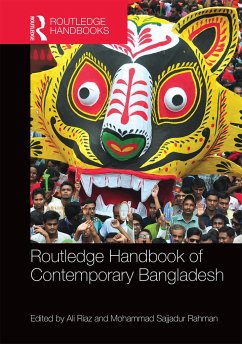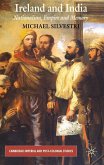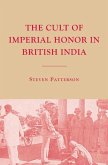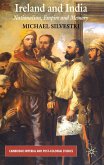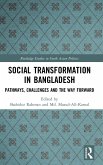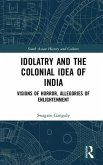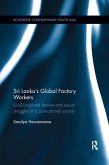Routledge Handbook of Contemporary Bangladesh
Herausgeber: Riaz, Ali; Sajjadur Rahman, Mohammad
Routledge Handbook of Contemporary Bangladesh
Herausgeber: Riaz, Ali; Sajjadur Rahman, Mohammad
- Gebundenes Buch
- Merkliste
- Auf die Merkliste
- Bewerten Bewerten
- Teilen
- Produkt teilen
- Produkterinnerung
- Produkterinnerung
In the past decade, Bangladesh has achieved significant social and economic progress. Despite high population density, a limited natural-resource base, underdeveloped infrastructure, frequent natural disasters and political uncertainty, the country has recorded positive developments in terms of broad economic and social indicators.
Andere Kunden interessierten sich auch für
![Ethnic Conflict in India Ethnic Conflict in India]() Na NaEthnic Conflict in India103,99 €
Na NaEthnic Conflict in India103,99 €![Ireland and India Ireland and India]() M. SilvestriIreland and India81,99 €
M. SilvestriIreland and India81,99 €![The Cult of Imperial Honor in British India The Cult of Imperial Honor in British India]() S. PattersonThe Cult of Imperial Honor in British India37,99 €
S. PattersonThe Cult of Imperial Honor in British India37,99 €![Ireland and India Ireland and India]() M. SilvestriIreland and India74,99 €
M. SilvestriIreland and India74,99 €![Social Transformation in Bangladesh Social Transformation in Bangladesh]() Social Transformation in Bangladesh191,99 €
Social Transformation in Bangladesh191,99 €![Idolatry and the Colonial Idea of India Idolatry and the Colonial Idea of India]() Swagato GangulyIdolatry and the Colonial Idea of India204,99 €
Swagato GangulyIdolatry and the Colonial Idea of India204,99 €![Sri Lanka's Global Factory Workers Sri Lanka's Global Factory Workers]() Sandya HewamanneSri Lanka's Global Factory Workers42,99 €
Sandya HewamanneSri Lanka's Global Factory Workers42,99 €-
-
-
In the past decade, Bangladesh has achieved significant social and economic progress. Despite high population density, a limited natural-resource base, underdeveloped infrastructure, frequent natural disasters and political uncertainty, the country has recorded positive developments in terms of broad economic and social indicators.
Hinweis: Dieser Artikel kann nur an eine deutsche Lieferadresse ausgeliefert werden.
Hinweis: Dieser Artikel kann nur an eine deutsche Lieferadresse ausgeliefert werden.
Produktdetails
- Produktdetails
- Verlag: Taylor & Francis
- Seitenzahl: 448
- Erscheinungstermin: 3. Februar 2016
- Englisch
- Abmessung: 247mm x 176mm x 30mm
- Gewicht: 938g
- ISBN-13: 9780415734615
- ISBN-10: 0415734614
- Artikelnr.: 42787212
- Herstellerkennzeichnung
- Libri GmbH
- Europaallee 1
- 36244 Bad Hersfeld
- 06621 890
- Verlag: Taylor & Francis
- Seitenzahl: 448
- Erscheinungstermin: 3. Februar 2016
- Englisch
- Abmessung: 247mm x 176mm x 30mm
- Gewicht: 938g
- ISBN-13: 9780415734615
- ISBN-10: 0415734614
- Artikelnr.: 42787212
- Herstellerkennzeichnung
- Libri GmbH
- Europaallee 1
- 36244 Bad Hersfeld
- 06621 890
Ali Riaz is Professor and Chair of Department of Politics and Government at Illinois State University, Illinois, USA. Previously, he worked as a Broadcast Journalist at the British Broadcasting Service (BBC) in London. His most recent publications include How Did We Arrive Here? (2015) and Political Islam and Governance in Bangladesh (Routledge, 2010). Mohammad Sajjadur Rahman is a Research Fellow at Centre for Alternatives, Dhaka, Bangladesh and a PhD student at Clark University, Massachusetts, USA. He has published a number of articles in scholarly journals and contributed chapters in edited volumes.
Introduction Part I: History and the Making of Contemporary Bangladesh 1. Bangladeshi Politics since Independence
Sarah Tasnim Shehabuddin 2. Nationalism and the 'Politics of National Identity'
Habibul Haque Khondker 3. Secularism and Anti-Secularism
Shantanu Majumder 4. The Genocide of 1971 and the Politics of Justice
Navine Murshid Part II: Politics and Institutions 5. Political Parties
Elections and Party Systems
Ali Riaz 6. The Parliament
Nizam Ahmed 7. Public Administration and Bureaucracy
Habib Zafarullah 8. Civil-Military Relations
Al Masud Hasanuzzaman 9. Non-Governmental Organizations and Civil Society
David Lewis Part III: Economy and Development 10. Development Policies since Independence
Fahmida Khatun 11. Agriculture and Food Security
Uttam Kumar Deb 12. Industrialization
Rashed Al Mahmud Titumir 13. Labor
Farida Chowdhury Khan 14. Foreign Trade
Selim Raihan 15. International Labor Migration and Remittance
Tasneem Siddiqui 16. Urbanization
A K M Riaz Uddin 17. Poverty
Inequality and Entrepreneurship
Syed Akhtar Mahmood 18. Microfinance
Muinul Islam Part IV: Energy and Environment 19. Power and Energy: Potentials
Crisis and Planning
Moshahida Sultana 20. Climate Change
M. Asaduzzaman 21. Water
Md. Khalequzzaman Part V: State
Society and Rights 22. Human Rights and the Law
Mohammad Shahabuddin 23. State of Gender
Amena Mohsin 24. The CHT and the peace process
Bhumitra Chakma 25. Religious Minorities
Meghna Guhathakurta 26. Print and Electronic Media
Anis Rahman 27. The Education System
Manzoor Ahmed 28. Public Health
Arafat Kabir Part VI: Security and External Relations 29. Foreign Policy
Imtiaz Ahmed 30. Bangladesh and its Neighbors
Mohammad Sajjadur Rahman 31. Bangladesh and the Great Powers
Lailufar Yasmin 32. Borders
Boundaries and Statelessness
Bina D'Costa 33. UN Peacekeeping Mission
Rashed Uz Zaman 34. Terrorism and Counter-terrorism
Saimum Parvez
Sarah Tasnim Shehabuddin 2. Nationalism and the 'Politics of National Identity'
Habibul Haque Khondker 3. Secularism and Anti-Secularism
Shantanu Majumder 4. The Genocide of 1971 and the Politics of Justice
Navine Murshid Part II: Politics and Institutions 5. Political Parties
Elections and Party Systems
Ali Riaz 6. The Parliament
Nizam Ahmed 7. Public Administration and Bureaucracy
Habib Zafarullah 8. Civil-Military Relations
Al Masud Hasanuzzaman 9. Non-Governmental Organizations and Civil Society
David Lewis Part III: Economy and Development 10. Development Policies since Independence
Fahmida Khatun 11. Agriculture and Food Security
Uttam Kumar Deb 12. Industrialization
Rashed Al Mahmud Titumir 13. Labor
Farida Chowdhury Khan 14. Foreign Trade
Selim Raihan 15. International Labor Migration and Remittance
Tasneem Siddiqui 16. Urbanization
A K M Riaz Uddin 17. Poverty
Inequality and Entrepreneurship
Syed Akhtar Mahmood 18. Microfinance
Muinul Islam Part IV: Energy and Environment 19. Power and Energy: Potentials
Crisis and Planning
Moshahida Sultana 20. Climate Change
M. Asaduzzaman 21. Water
Md. Khalequzzaman Part V: State
Society and Rights 22. Human Rights and the Law
Mohammad Shahabuddin 23. State of Gender
Amena Mohsin 24. The CHT and the peace process
Bhumitra Chakma 25. Religious Minorities
Meghna Guhathakurta 26. Print and Electronic Media
Anis Rahman 27. The Education System
Manzoor Ahmed 28. Public Health
Arafat Kabir Part VI: Security and External Relations 29. Foreign Policy
Imtiaz Ahmed 30. Bangladesh and its Neighbors
Mohammad Sajjadur Rahman 31. Bangladesh and the Great Powers
Lailufar Yasmin 32. Borders
Boundaries and Statelessness
Bina D'Costa 33. UN Peacekeeping Mission
Rashed Uz Zaman 34. Terrorism and Counter-terrorism
Saimum Parvez
Introduction Part I: History and the Making of Contemporary Bangladesh 1. Bangladeshi Politics since Independence
Sarah Tasnim Shehabuddin 2. Nationalism and the 'Politics of National Identity'
Habibul Haque Khondker 3. Secularism and Anti-Secularism
Shantanu Majumder 4. The Genocide of 1971 and the Politics of Justice
Navine Murshid Part II: Politics and Institutions 5. Political Parties
Elections and Party Systems
Ali Riaz 6. The Parliament
Nizam Ahmed 7. Public Administration and Bureaucracy
Habib Zafarullah 8. Civil-Military Relations
Al Masud Hasanuzzaman 9. Non-Governmental Organizations and Civil Society
David Lewis Part III: Economy and Development 10. Development Policies since Independence
Fahmida Khatun 11. Agriculture and Food Security
Uttam Kumar Deb 12. Industrialization
Rashed Al Mahmud Titumir 13. Labor
Farida Chowdhury Khan 14. Foreign Trade
Selim Raihan 15. International Labor Migration and Remittance
Tasneem Siddiqui 16. Urbanization
A K M Riaz Uddin 17. Poverty
Inequality and Entrepreneurship
Syed Akhtar Mahmood 18. Microfinance
Muinul Islam Part IV: Energy and Environment 19. Power and Energy: Potentials
Crisis and Planning
Moshahida Sultana 20. Climate Change
M. Asaduzzaman 21. Water
Md. Khalequzzaman Part V: State
Society and Rights 22. Human Rights and the Law
Mohammad Shahabuddin 23. State of Gender
Amena Mohsin 24. The CHT and the peace process
Bhumitra Chakma 25. Religious Minorities
Meghna Guhathakurta 26. Print and Electronic Media
Anis Rahman 27. The Education System
Manzoor Ahmed 28. Public Health
Arafat Kabir Part VI: Security and External Relations 29. Foreign Policy
Imtiaz Ahmed 30. Bangladesh and its Neighbors
Mohammad Sajjadur Rahman 31. Bangladesh and the Great Powers
Lailufar Yasmin 32. Borders
Boundaries and Statelessness
Bina D'Costa 33. UN Peacekeeping Mission
Rashed Uz Zaman 34. Terrorism and Counter-terrorism
Saimum Parvez
Sarah Tasnim Shehabuddin 2. Nationalism and the 'Politics of National Identity'
Habibul Haque Khondker 3. Secularism and Anti-Secularism
Shantanu Majumder 4. The Genocide of 1971 and the Politics of Justice
Navine Murshid Part II: Politics and Institutions 5. Political Parties
Elections and Party Systems
Ali Riaz 6. The Parliament
Nizam Ahmed 7. Public Administration and Bureaucracy
Habib Zafarullah 8. Civil-Military Relations
Al Masud Hasanuzzaman 9. Non-Governmental Organizations and Civil Society
David Lewis Part III: Economy and Development 10. Development Policies since Independence
Fahmida Khatun 11. Agriculture and Food Security
Uttam Kumar Deb 12. Industrialization
Rashed Al Mahmud Titumir 13. Labor
Farida Chowdhury Khan 14. Foreign Trade
Selim Raihan 15. International Labor Migration and Remittance
Tasneem Siddiqui 16. Urbanization
A K M Riaz Uddin 17. Poverty
Inequality and Entrepreneurship
Syed Akhtar Mahmood 18. Microfinance
Muinul Islam Part IV: Energy and Environment 19. Power and Energy: Potentials
Crisis and Planning
Moshahida Sultana 20. Climate Change
M. Asaduzzaman 21. Water
Md. Khalequzzaman Part V: State
Society and Rights 22. Human Rights and the Law
Mohammad Shahabuddin 23. State of Gender
Amena Mohsin 24. The CHT and the peace process
Bhumitra Chakma 25. Religious Minorities
Meghna Guhathakurta 26. Print and Electronic Media
Anis Rahman 27. The Education System
Manzoor Ahmed 28. Public Health
Arafat Kabir Part VI: Security and External Relations 29. Foreign Policy
Imtiaz Ahmed 30. Bangladesh and its Neighbors
Mohammad Sajjadur Rahman 31. Bangladesh and the Great Powers
Lailufar Yasmin 32. Borders
Boundaries and Statelessness
Bina D'Costa 33. UN Peacekeeping Mission
Rashed Uz Zaman 34. Terrorism and Counter-terrorism
Saimum Parvez

